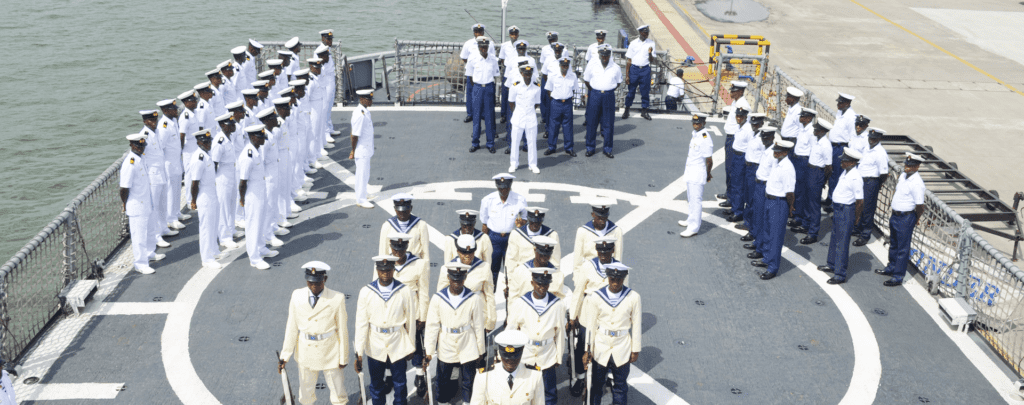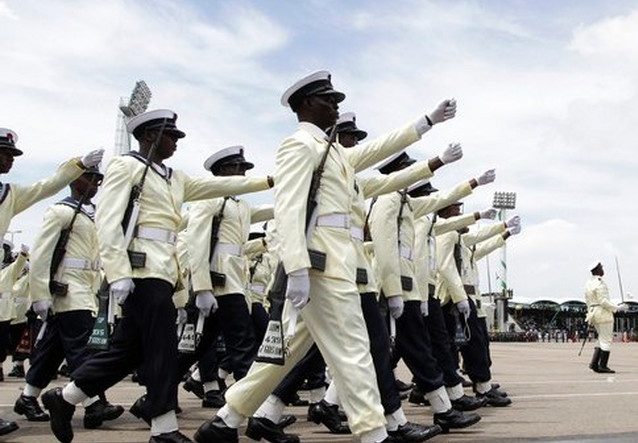The Nigerian Navy is the aquatic component of the Nigerian Armed forces. They are responsible for guarding the integrity of Nigeria’s waters, both from pirates and external aggression. The Nigerian Navy is the biggest in sub-Saharan Africa in terms of manpower and weapon sophistication. Perhaps only the South African Navy can rival the Nigerian Navy in terms of technicalities in sub–Saharan Africa. All these couldn’t have been possible without officers of the Nigerian Navy who man various responsibilities according to their ranks.
Rank Structure in the Nigerian Navy
There are two different rank structures in the Nigerian Navy; the commissioned officers and the non-commissioned officers. The commissioned officers are higher in the cadre and therefore rank above the non-commissioned officers.
Commissioned Officers
Commissioned officers are those who got into the Navy with university degrees or graduated from NDA (National Defense Academy). The NDA is a military university of Nigeria, where young men, and recently women, go to study various courses same as what is obtainable in conventional universities and at the same time learn about the military. Ideally, these young men and women are the best of the best of what Nigeria has to offer in the Navy amongst the young populace. Commissioned officers are selected through a series of vigorous mental and physical examinations.
Ranks of Commissioned Officers from Top to Bottom
- Admiral of the fleet – This position is unattainable, at least in the Nigerian Navy, so this begs the question, why the presence of an unattainable goal? This is equivalent to a Field marshal in the army.
- Admiral – This is the topmost attainable position in the Nigerian Navy. It is amongst this rank that the Chief of Naval Staff (CNS) is chosen. He reports only to the president and chief of Defence staff. The CNS is the highest position that anyone in the Nigerian Navy can hold.
- Rear Admiral
- Commodore – this is equivalent to a one-star general in the army.
- Captain
- Commander
- Lieutenant Commander
- Lieutenant
- Sub-Lieutenant
- Acting Sub-Lieutenant
- Mid-Shipman
The Ranks of Non-commissioned Officers from Top to Bottom
- Master Warrant Officer
- Warrant Officer
- Petty officer
- Leading Seaman
- Able Seaman
- Seaman
- Ordinary Seaman
- Trainee
Requirements for Promotion in the Nigerian Navy
For these ranks in the Nigerian Navy, getting promoted is usually by merit. However, there are criteria for promotion according to an officer’s rank. Once those criteria have been fulfilled, when it’s promotion time, the officer will get promoted. The officer must have spent at least 4 years in their present rank; however, some ranks require more time before an officer can get promoted.
Next, the officer should have passed the promotional exams, acquired sea experience or combat experience, and of course, pass the mandatory swimming test. For doctors who join the Nigerian Navy, their first promotion is 2 years, and then the next is 4 years.
For working in the Navy, an officer receives regular allowances, like health allowance, housing allowance if the officer lives outside the barracks, hazard allowance, depending on where the officer was deployed to or if the officer is fighting in a war, and then finally death allowance, which is paid to the family of the deceased officer.
Nigerian Navy Ranks and Their Salaries
Officers of the Nigerian Navy are paid different amounts depending on their ranks. These ranks obviously come with different responsibilities.
Annual Salaries of Commissioned Officers
- Admiral – N16,303,140 million per annum
- Vice admiral – N13,363,229 per annum
- Rear Admiral – N12,038,945 per annum
- Commodore – N7,385,856 per annum
- Captain – N3,715,859 per annum
- Commander – N3,380,086 per annum
- Lieutenant – N2,404,037 to N2,789,818
- Sub-lieutenant – N2,255,911 to N2,630,801 per annum
- Midshipman earns – N2,077,875 to N2,245,909 yearly
- Navy Warrant Officer – N1,908,718 to N2.061,520 yearly
- Master Warrant Officer – N1,783,029 to N1,962,697 per annum
- Warrant Officer – N1,022,320 to N1,192,499 per annum
- Cadet training – N471,038 to N532,773 per annum
Average Salaries of Non-Commissioned Officers
- Marine Engineer – N95,000
- Naval Engineer – N229,000
- ICT Security Expert – N79,000
- Communicator – N51,000
- Navy Recruit – 76,000
Brief History of The Nigerian Navy
Founded in 1914 by the colonial masters, they were first known as the Nigerian Marine. Some years later, the name was changed to the Nigerian Naval force, becoming a full-fledged Navy, at least on paper. Those who maned the posts were from the Nigerian Marine.
About three years before independence, the first Nigerian Naval officers were commissioned. They were 60 in number and were all non-commissioned officers; the commissioned officers were only brits.
By independence, the name changed to the Royal Nigerian Navy, and by 1963, when Nigeria became a republic, the name was then changed to the Nigerian Navy as we fully weaned ourselves off the vestiges of colonial rule. Since then, the armed forces have grown, and the Nigerian Navy ranks as one of the best in Africa.
The Role of the Nigerian Navy Under the Nigerian Armed Forces
The role of the Nigerian Navy includes but is not limited to the following:
- Protecting the territorial waters of Nigeria both from domestic and foreign aggression.
- Defense of the economic exclusive zone of Nigeria
- Protecting economic activities on the waterways such as pipelines and sea merchants.
Here’s How to Join the Nigerian Navy
There are three ways to join the Nigerian Navy. Two ways will make you become a commissioned officer, and then one way, which is the easiest to come in through, will make you a non-commissioned officer.
Regular Combatant Course (RC)
This course lasts for 5 years, where 4 out of the 5 are for academic training and one year is for military training, where you are admitted into the Nigerian Defence Academy. You have to have completed secondary school education with at least 5 credits in your SSCE, including English and Mathematics. You must also be between the ages of 17 -21. This is the most coveted way of joining the Nigerian Military. It is said that NDA guys run the military, and to a large extent, it is true. They can go all the way to become the Chief Naval Staff (CNS), unlike the other pathways.
To join the Navy, you also should be a Nigerian as stipulated by the Nigerian constitution, be of good moral standing, be physically and medically fit and stand at a minimum of 1.68 m for males and 1.50 m for females. This course lasts for 5 years, and upon graduation, you become a commissioned officer of the Nigerian Navy with the midshipman rank, which you can now improve with the amount of time you spend in the military, the courses you attend, and of course, your achievements.
Direct Short Service Commission (DSC)
Also, those who already have careers but would like to switch into the military are welcome. This role is for non-combat positions in the Nigerian army. Doctors, Engineers, Nurses, and so on fall into this category. This training usually lasts for 6 months. To be eligible for this, you have to be between the ages of 22 to 35. You should have a BSC or HND with a minimum of lower credit.
Short Service Combat Commission (SC)
To join the Navy from here, you’d also need to be a graduate of a Nigerian university or Polyethnic with a minimum of second class lower, or its equivalent. You should be between the ages of 22 -28 to join. And, of course, the other rules that apply to those joining from NDA also apply to you. The duration of this course is 9 months, and it’s for those who are interested in combat positions in the military. You might still be deployed to a non-combat position, especially seeing that you went to a civilian university. Only about 300 people are picked per course; therefore, it is very competitive.
Basic Training (AKA Recruit)
To join the navy as a recruit, all you’ll need is your SSCE. This position of for combat roles in the Nigerian Navy, and at the end of 6 months of training, you are deployed. Here you’ll be a non-commissioned officer of the Nigerian Navy, and you’ll be subject to all those in the officer cadre, irrespective of your experience or how long you’ve spent in the military. When you’re done with your training, you’ll be a non-commissioned officer with the rank of ordinary seaman.
The join the Navy, you have to wait for when the form comes out. This is usually around mid-July every year that it is for DSSC. If you love fighting, you are comfortable around water, would love to lend your strength in defense of the territorial integrity of Nigeria and her waters, the Navy might be for you. Apart from the salaries, there are many other benefits you gain from joining the Nigerian Navy. And if one dies in combat, especially as a commissioned officer, your family is taken care of by the military.
It would be best to join the Nigerian navy as a commissioned officer; the perks are way better, as you can see, than joining as a non-commissioned officer. Also, combat roles are given more credence than non-combat roles. Therefore, joining as a combatant gives you better room to make headway in the military, although it’s also more dangerous.
The Chief of Naval staff is the overall commander of the Nigerian Navy; he reports to the Chief of Defence Staff, who reports to the Minister of Defence and then the Commander in Chief of the Nigerian Armed forces, the President.


